英语:西方文化禁忌共21页
中西方禁忌(Taboos between China and Western countries)
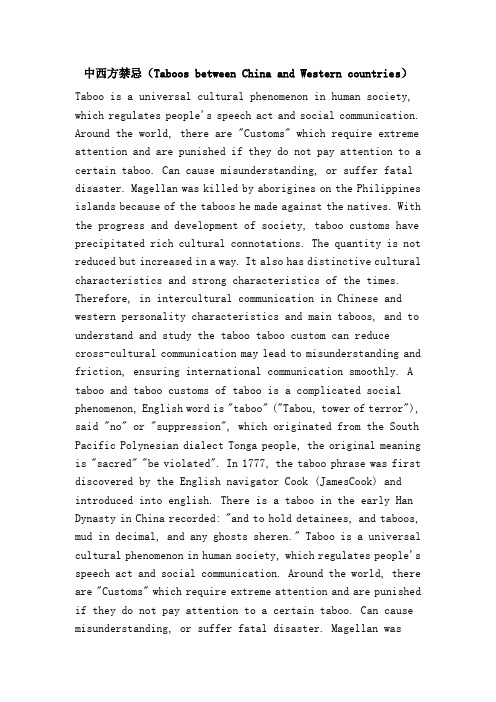
中西方禁忌(Taboos between China and Western countries)Taboo is a universal cultural phenomenon in human society, which regulates people's speech act and social communication. Around the world, there are "Customs" which require extreme attention and are punished if they do not pay attention to a certain taboo. Can cause misunderstanding, or suffer fatal disaster. Magellan was killed by aborigines on the Philippines islands because of the taboos he made against the natives. With the progress and development of society, taboo customs have precipitated rich cultural connotations. The quantity is not reduced but increased in a way. It also has distinctive cultural characteristics and strong characteristics of the times. Therefore, in intercultural communication in Chinese and western personality characteristics and main taboos, and to understand and study the taboo taboo custom can reduce cross-cultural communication may lead to misunderstanding and friction, ensuring international communication smoothly. A taboo and taboo customs of taboo is a complicated social phenomenon, English word is "taboo" ("Tabou, tower of terror"), said "no" or "suppression", which originated from the South Pacific Polynesian dialect Tonga people, the original meaning is "sacred" "be violated". In 1777, the taboo phrase was first discovered by the English navigator Cook (JamesCook) and introduced into english. There is a taboo in the early Han Dynasty in China recorded: "and to hold detainees, and taboos, mud in decimal, and any ghosts sheren." Taboo is a universal cultural phenomenon in human society, which regulates people's speech act and social communication. Around the world, there are "Customs" which require extreme attention and are punished if they do not pay attention to a certain taboo. Can cause misunderstanding, or suffer fatal disaster. Magellan waskilled by aborigines on the Philippines islands because of the taboos he made against the natives. With the progress and development of society, taboo customs have precipitated rich cultural connotations. The quantity is not reduced but increased in a way. It also has distinctive cultural characteristics and strong characteristics of the times. Therefore, in intercultural communication in Chinese and western personality characteristics and main taboos, and to understand and study the taboo taboo custom can reduce cross-cultural communication may lead to misunderstanding and friction, ensuring international communication smoothly. A taboo and taboo customs of taboo is a complicated social phenomenon, English word is "taboo" ("Tabou, tower of terror"), said "no" or "suppression", which originated from the South Pacific Polynesian dialect Tonga people, the original meaning is "sacred" "be violated". In 1777, the taboo phrase was first discovered by the English navigator Cook (JamesCook) and introduced into english. There is a taboo in the early Han Dynasty in China recorded: "and to hold detainees, and taboos, mud in decimal, and any ghosts sheren." tabooIncluding the nature, natural objects (stars, lightning) as a sacred form about their taboos and behavior; of some animals and plants taboo; worship of ancestors and gods, the gods and ancestors have symbolic relics taboo [1], also formed in interpersonal relationships in the long-term taboo customs. Freud, a famous psychologist in Austria, made a deep study of the cultural phenomenon of taboo in his book totem and taboo. In his view, Tab (taboo), in our view, it represents two different aspects of meaning. First of all, it's "mysterious", "dangerous", "forbidden", and "unclean"". The opposite of Tabin Polynesian language is "NOA", which means "popular" or "usually approachable". So, that means a taboo have been restricted or prohibited and can not touch the nature of things exist. We usually say "sacred person or thing" in meaning and has some of the same tower [2]. Generally passed through oral inheritance and social demonstration. "Taboos are almost everywhere. In the same culture,Taboos differ and differ because of regional or sub cultural differences. Taboos vary much in different cultures." [3] taboos involve speech acts, and if you do not pay attention to or disrespect each other's taboos, it is easy to hurt each other's feelings. Because of this, more people taboo communication, especially cross-cultural communication is a sort of a small obstacle. Taboo refers to violations of the expectations of the society, it not only comes from the people of some mysterious force of fear, but also contains people in the long-term accumulation of experience in the struggle with nature, and formed in interpersonal communication in the long-term social etiquette. Taboo customs vary according to nationality, society, culture, region, occasion and so on. Therefore, people must be very sensitive to taboos incross-cultural communication and have to study it. They have to pay attention to it and have to avoid it in order to communicate smoothly. Two, the taboo characteristics of Chinese and Western taboos are the common cultural phenomena of different ethnic groups in the world, but the content and form of taboos are different. Taboos, as a kind of non behavioral normative folk customs, are closely related to the cultural characteristics and traditions of the society in which taboos are based. In the course of human history, the samenation usually has a common spiritual structure, value system, psychological characteristics and behavior patterns, and it is in this common cultural background that they have a sense of belonging and identity. The dialectics of Chinese classical philosophy emphasizes the harmony and interpenetration of opposites, that is, unity in opposites, and the whole world is a unity. The book of changes uses the interaction of two opposing forces, yin and Yang, to explain the development and change of things. Chinese traditional culture emphasizes the harmony between man and nature as a whole. "Harmony" in the political field is the spring and autumn unified concept, on ethical performance for the overall situation; in terms of value, although the ancient China is private ownership, but on the relationship between individual and society still emphasize collectivism, value orientation in order to safeguard the overall interests of the. With the changes of the times, the phenomenon of taboo which reflects the patriarchal clan system and hierarchy has disappeared. But there are still taboos in appellation. The dialectics of western philosophy is similar to the dialectics of Chinese classical philosophy. Heraclitus, an ancient Greek philosopher, also believes that the world is a harmonious unity. However, the 14 sixteenth Century European Renaissance and religious reform is like a star in the night of seventeenth Century; Newton and other scientists reveal the secrets of the universe, inductive reasoning observation, Bacon advocated the scientific research as the hard facts; eighteenth Century cultural enlightenment movement swept Europe and the United States, national independence, democracy and Republic, within the in the 21st century, "the world is a philosophy in the unity of opposites", the pursuit of "freedom and equality" and "civil rights, thepeople" concept and "individual struggle" in the western society is deeply rooted in the hearts of "individual standard" consciousness as the mainstream consciousness. For the pursuit of freedom and human rights, the concept of "privacy" (Privacy) in personal life is extremely developed, and privacy has become an important content of taboos. In this colorful folk culture, some factors vary from culture to culture, western culture is likely to be highly appreciated from the Chinese culture, and Chinese culture of "bad habits" may be as unalterable principles in western culture. Some topics are popular in Chinese culture, but in Western cultures it may constitute a violation of privacy. "When in Rome, do as the Romans do" is a must. Three, the taboos of Chinese and western social taboos mainly exist in all aspects of human social interaction. Chinese and Western English speaking countries have different social taboos because of different cultural backgrounds, cultural traditions, religious beliefs and different hierarchical concepts. 1. self esteem and privacy incross-cultural communication, involving Chinese self-esteem or "face" and Westerners privacy issues is absolutely not openly asked, otherwise it will be regarded as rude and disrespectful. The Chinese people pay most attention to "face"". In Chinese culture, "face" is a symbol of status, identity, honor and self-respect. Chinese saying "don't hit the face,Don't speak Jieduan, Chinese the biggest taboo is related to personal dignity "weaknesses" and "pain" and "shortcomings" "wrong" and so on. Chinese people are good at face, criticism can not be mentioned directly, but should be expressed in a tactful way. No evil human nature concept in China. For the personality cultivation of the heart should be mature and timesof day. Instead of trying hard to improve one's own character, but to pay attention to the faults of others, just as a stone hits his own foot, society will come to the concept of "disgrace" and so on。
中西文化语言禁忌

中西方文化中使用语言的禁忌在许多语言里都忌讳诅咒、骂人的话。
英语和汉语都是这样的,但还要说明一下:第一,有些骂人的话过于粗鄙、难听,所以受到社会更严格的限制。
英语中的Jesus Christ, Holy Mary, Son of a bitCh就是这种话;而Damn, Damn it,Hell这样的话在语气上就稍微轻一些。
请注意,在英语中,大部分诅咒、骂人的话与基督教的词语和名称有关。
在汉语中这种固定的咒骂或骂人的话似乎少些,最常用的是“他妈的”,但听的人不会引起很强烈的反感,因为有时它巳转化为无教养的人的口头语。
第二,诅咒、骂人的话受到年龄、性别、职业的限制。
孩子骂人马上会受到大人责备。
妇女骂人会被人认为粗俗失礼。
教师骂人被认为有失体统。
第三,这种话也受环境和场合的限制。
在当众发言、课堂教学或和有一定社会地位的人在一起时,人们就不大会说诅咒、骂人的话。
在家里、在劳动场合、在办公室、在公共汽车上或市场上,说的人就比较多。
应当指出,人们对诅咒、骂人的话反应并不始终如一。
有些这样的话听得多了,也就不那么刺耳。
现在人们常听到年轻人用骂人活。
不过,对非本族人还是少讲祖活为妙。
现在谈一下英语和汉语在禁忌方面的不同处,先讲一个有趣的故事;一位50来岁的美国妇女在中国任教。
有一位年轻的中国同事请她到自己家里来吃饭。
一进门。
女主人就把4岁的女儿介绍给客人。
小姑娘用英语说:“阿姨好”!她妈妈跟她说过,见了成年妇女要这样问好。
“不对,不能叫阿姨”,妈妈连忙纠正说,“要叫奶奶。
”“不要叫奶奶。
就叫我阿姨好了。
”“那太没有礼貌了。
您比我年纪大多了。
”美国妇女脸红了,笑笑说:“就叫我阿姨吧。
我喜欢这样”。
为什么美国妇女在这种场合会感到尬尴呢?因为中国人和美国人对待年龄问题的态度不同。
对大多数英国人和美国人来说,打听陌生入或不大熟悉的人的年龄是不得体的。
此外,收入多少、是否已婚、政治倾向、宗教信仰等,除非对方表示不大意,这些情况也不宜过问,否则就是失礼。
一个国家的文化习俗和禁忌英文作文

一个国家的文化习俗和禁忌英文作文Culture and Customs: Taboos in a CountryEvery country has its own unique culture, customs, and traditions. These cultural aspects define the society and shape the behavior of its people. In addition to the celebrations and festivals that showcase a country's culture, there are also certain taboos that are strictly observed and followed by the locals. Understanding these taboos is essential for visitors to ensure they do not inadvertently offend the locals or disrespect their traditions.One country known for its rich culture and deep-rooted customs is Japan. Japanese society is deeply influenced by traditions and etiquettes that have been passed down through generations. Among these traditions are several taboos that are important to be aware of when visiting Japan.One of the most well-known taboos in Japan is the custom of taking off shoes before entering a home. In Japanese culture, wearing shoes inside the house is considered unclean and disrespectful. Visitors are expected to remove their shoes at the genkan, the entrance area of a home, and put on slippers provided by the host. Stepping onto tatami mats with shoes on isespecially taboo, as it is believed to bring bad luck and impurity into the home.Another important taboo in Japan is the proper way of giving and receiving gifts. When presenting a gift to someone in Japan, it is customary to wrap it in beautifully decorated wrapping paper and offer it with both hands. The recipient is expected to receive the gift with both hands as well, and it is considered rude to open the gift in front of the giver. Additionally, gifts should not be wrapped in white or black paper, as these colors are associated with funerals in Japanese culture.In terms of dining etiquette, there are several taboos to be aware of when eating in Japan. It is considered impolite to stick chopsticks upright in a bowl of rice, as this gesture resembles the ritual of offering food to the deceased. Instead, chopsticks should be placed horizontally across the bowl or on a chopstick rest. Slurping noodles, on the other hand, is not considered rude in Japan and is often a sign of enjoying the meal.In addition to these customs and taboos, there are also certain topics that are best avoided in conversation in Japan. Asking personal questions about someone's age, income, or relationships is considered impolite in Japanese culture. It is also important to show respect towards elders and authority figures,using honorific language and bowing when greeting or thanking them.Overall, being mindful of these cultural taboos and customs is essential when visiting Japan or any other country. By showing respect for the local traditions and customs, visitors can ensure a positive and enjoyable experience while also gaining a deeper understanding of the culture and values of the country.。
风俗习惯之世界各地的文化禁忌中英文对照版
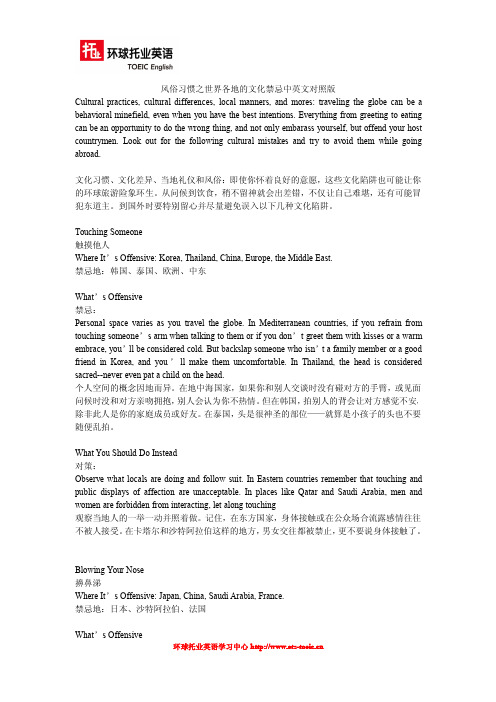
禁忌:
环球托业英语学习中心
Take off your shoes when arriving at the door of a London dinner party and the hostess will find you uncivilized, but fail to remove your shoes before entering a home in Asia, Hawaii, or the Pacific Islands and you ’ ll be considered disrespectful. Not only does shoe removal very practically keeps sand and dirt out of the house, it’s a sign of leaving the outside world behind. 到伦敦人家里参加宴会时脱掉鞋子,女主人会认为你不文明,但去亚洲、夏威夷或太平洋群 岛的居民家中不脱鞋却被认为失礼。脱掉鞋子不仅把沙粒与尘土留在了门外,更意味着把外 面的世界抛之脑后。
Talking Over Dinner 就餐时谈话 Where It’s Offensive: Africa, Japan, Thailand, China, Finland. 禁忌地:非洲、日本、泰国、芬兰
What’s Offensive 禁忌: In some countries, like China, Japan, and some African nations, the food’s the thing, so don’t start chatting about your day’s adventures while everyone else is digging into dinner. You’ll likely be met with silence--not because your group is unfriendly, but because mealtimes are for eating, not talking. Also avoid conversations in places a country might consider sacred or reflective--churches in Europe, temples in Thailand, and saunas in Finland. 在日本和一些非洲国家,吃饭就是吃饭,所以当其他人都在大快朵颐时,不要谈论你当天的 经历。你可能会遭遇沉默——这并非你的同伴不友好,而是因为就餐时间只应吃饭,无需交 谈。也要避免在一些被认为是神圣或需要沉思的地方谈话——比如欧洲的教堂、泰国的庙宇 和芬兰的桑拿浴室。
中西方文化交际中的花卉禁忌
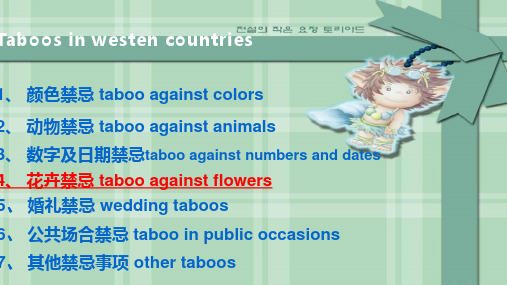
花卉禁忌
在通常以花为礼的交往中,许多欧洲人爱用切花,忌用 盆花,但在复活节之际,可用盆栽的风信子为礼
花卉禁忌
在国际场合,
忌用杜鹃花、
石竹花 (法国人认为它会带来灾难)
献给客人,已成为惯例。
杜鹃花 rhododendron /əudə’dendrən/
到德国友人那儿做客,千万不能送玫瑰花,因为它表示你暗恋着女主人
2、 动物禁忌 taboo against animals
到波兰人家里做客,给女主人送花应避免送红玫瑰,因为它表示浪漫的爱情
除人造花之外,波兰人忌送干花或枯萎的花。波兰人认为, 送干花或枯花,意味着情谊的终结
德国人往往忌以郁金香 (tulip /’tju:lip/)为馈赠品。他 们认为它是无情之花
巴西人忌用绛紫色的花为礼,因为巴西人惯 以紫花为葬礼之 花,认为那是死亡的征兆
花卉禁忌
送礼时,切忌送黄色的花。法国,黄色的花象征 夫妻间的不忠贞;在墨西哥,它代表死亡,在英 国传统习俗中,黄玫瑰象征亲友分离。
花卉禁忌
探视病人时, 人
严忌以根花(包括盆花)为礼——日文的“根”字与 “睡”字的发音相同 不吉利 仙客来 —— 念为“希苦拉面”,而“希”同日文的 “死”发音相同
淡黄花及白花——多为 人不喜欢
忌用山茶花——山茶花凋谢时整个花头落地
花卉禁忌
一些欧洲国家的人,在探望病人时,往往忌用香气浓烈 的或具有特殊象征义的鲜花 送予中年人的,忌用小花 送予年轻人的,忌用大花
Taboos in westen countries
1、 颜色禁忌 taboo against colors 2、 动物禁忌 taboo against animals 3、 数字及日期禁忌taboo against numbers and dates 4、 花卉禁忌 taboo against flowers 5、 婚礼禁忌 wedding taboos 6、 公共场合禁忌 taboo in public occasions 7、 其他禁忌事项 other taboos
英语专业论文(中西方文化禁忌)
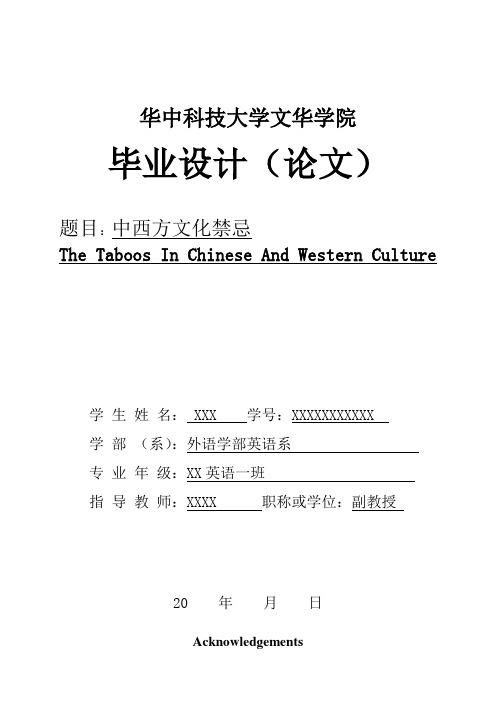
华中科技大学文华学院毕业设计(论文)题目:中西方文化禁忌The Taboos In Chinese And Western Culture学生姓名: XXX 学号:XXXXXXXXXXX学部(系):外语学部英语系专业年级:XX英语一班指导教师:XXXX 职称或学位:副教授20 年月日AcknowledgementsFirst and foremost, my appreciation goes to my affectionate parents, and the rest of my family. Throughout the development of this paper, they have been there always giving me continuous support, encouragement and understanding. Their love and support encourage me to pursue progress all the time.I would also like to extend my sincere thanks to all other teachers who gave me lectures during the past four academic years. I have benefited so much not only from their courses and lectures but also from their constant encouragement.Finally, my deepest gratitude and respect go to my supervisor, Zhong Liping. It is for his constant encouragement, critical instructions, his great care and precious advice and suggestions that this paper appears in the present form.AbstractWith the development of economic globalization and China's Reform and Opening up, the connection between China and western countries are Increasingly close. And the communication and collisions between the Chinese and western culture also appear in each person's life. This thesis mainly introduced the Chinese and western cultural taboo from the definition of taboo to origin, then to the differences between Chinese and western cultural taboos, and finally research how to avoid touching these taboo in daily communication. This thesis involves these taboos of name, address, gender, race, religion, superstition and other espects relate to our life.And through these research readers will not touched others’ taboo and even influence people’s relationship in communication.Key words:Chinese and western; taboo; definition; origin of taboo; species of taboo; details of taboo; how to avoid touching taboo随着经济全球化的发展和中国对外开放程度的加深,中国和西方国家的联系也日益密切起来,中西方文化之间的交流和碰撞也出现在了每个人的生活中。
跨文化交际文化禁忌讲课

英汉不同的禁忌话题
1年老 • 在中国; 老字常带敬意;是资历和地位的象征;因此
汉语中有老师 老同志 老大爷 老师傅等 • 西方人费尽心机地借用其他词项来委婉地表示old
这一概念;如 a seasoned man历练者;the advanced in age年长者;the mature成熟者 ;elder hospital 老人团;retirement home敬老院 ;private hospital老人院 ;nursing home养老院 ;golden age club老年俱乐部
2称谓
• 古代汉语中尤其忌讳晚辈的名字与长辈的相同;或 者有谐音字 同音字
• 而在英美文化中就没有这么多禁忌
• 美国有许多城市 街道 地名用著名总统 Washington华盛顿 Lincoln林肯等命名;
• 而美国各名牌大学常以赞助人的名字命名;如 Harvard Stanford等 因而英语中有name afte在语言交际 中人们总是回避它;尽量用委婉语代之 英语 中表示死亡的委婉语非常丰富;如pass away; go to the heaven; go to sleep; go to see the God; depart; be in heaven with God 等等
性爱
• 自古以来;各民族对性爱都十分谨慎;谈及时 常常拐弯抹角;回避或以其他间接方式婉称 英语中谈及 性行为的委婉语有 make love; art of pleasure; to approach 等
• 谈及怀孕时; 英语很少直接用 pregnant; 而 是说 in the family way; in a delicate condition等
饮食禁忌 taboos in diet
浅谈西方国家的禁忌
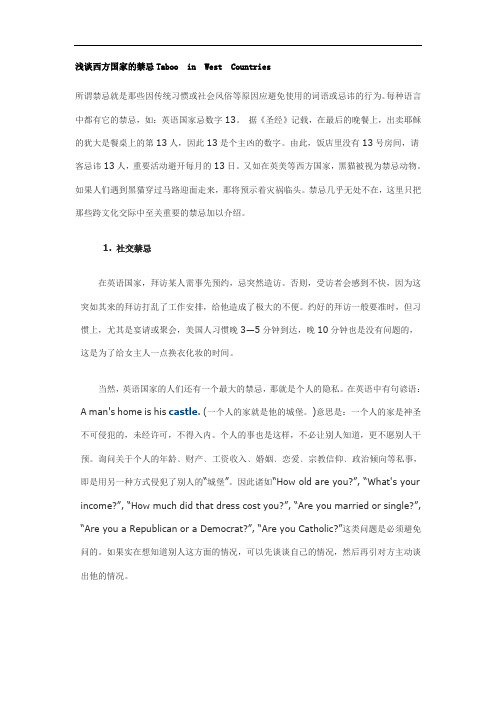
浅谈西方国家的禁忌Taboo in West Countries所谓禁忌就是那些因传统习惯或社会风俗等原因应避免使用的词语或忌讳的行为。
每种语言中都有它的禁忌,如:英语国家忌数字13。
据《圣经》记载,在最后的晚餐上,出卖耶稣的犹大是餐桌上的第13人,因此13是个主凶的数字。
由此,饭店里没有13号房间,请客忌讳13人,重要活动避开每月的13日。
又如在英美等西方国家,黑猫被视为禁忌动物。
如果人们遇到黑猫穿过马路迎面走来,那将预示着灾祸临头。
禁忌几乎无处不在,这里只把那些跨文化交际中至关重要的禁忌加以介绍。
1. 社交禁忌在英语国家,拜访某人需事先预约,忌突然造访。
否则,受访者会感到不快,因为这突如其来的拜访打乱了工作安排,给他造成了极大的不便。
约好的拜访一般要准时,但习惯上,尤其是宴请或聚会,美国人习惯晚3—5分钟到达,晚10分钟也是没有问题的,这是为了给女主人一点换衣化妆的时间。
当然,英语国家的人们还有一个最大的禁忌,那就是个人的隐私。
在英语中有句谚语:A man's home is his castle. (一个人的家就是他的城堡。
)意思是:一个人的家是神圣不可侵犯的,未经许可,不得入内。
个人的事也是这样,不必让别人知道,更不愿别人干预。
询问关于个人的年龄﹑财产﹑工资收入﹑婚姻﹑恋爱﹑宗教信仰﹑政治倾向等私事,即是用另一种方式侵犯了别人的“城堡”。
因此诸如“How old are you?”, “What's your income?”, “How much did that dress cost you?”, “Are you married or single?”, “Are you a Republican or a Democrat?”, “Are you Catholic?”这类问题是必须避免问的。
如果实在想知道别人这方面的情况,可以先谈谈自己的情况,然后再引对方主动谈出他的情况。
跨文化交际-文化禁忌-讲课PPT课件
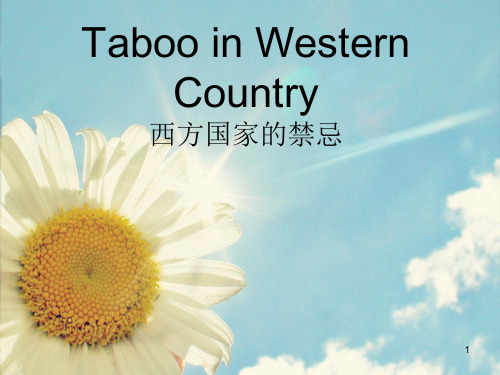
You’d better don’t send people flowers in even number.
22
Taboo about number 13& Friday
• The number of 13
23
• Friday
24
星期五
• 汉语则说“有了” 、 “有喜了” 、 “快 要当妈妈了”
14
排泄
• 厕所 在美国一般都叫rest room或bath room(男女厕均可 )或分别叫做 men‘s room 或 ladies‘ room(=powder room),不过在飞机上,则叫 lavatory,在军中又叫 latrine。至于 W.C.(water closet)乃是过去英国人用的 ,在美国,几乎没有人使用。
25
Taboo about language
• ?the big C/Long illness Cancer
• ?social disease ADIS
• ?Answer nature’s call/Pass water
26
Taboo about gesture
• In Great Britain, you'd better not do "V" gestures with palm inward. Because it is considered to be provocative or insult.
6
汉语中的禁忌
• 谐音式禁忌 • 用反义语来替换不吉的词语
,谓“讨口彩” • 用比喻来代替不吉的词语。
7
谐音式禁忌
• 旧时代的戏班子里有很多机会的字,尤其 最忌讳“散”字。因为散班是戏班里最大 的灾难,凡事与“散”字同音的,也必须 用别的字代替。比如雨伞,因为“伞”字 与“散”同音,得叫“雨盖”、“雨挡” 、“雨遮”、“雨拦”。又如船上人讳言 “翻身、搁住”等字眼,于是把“帆”叫 做“蓬”,把“箸”叫作“筷”。
西方的数字文化与禁忌英语作文

西方的数字文化与禁忌英语作文Western culture is rich in traditions and customs, and one such fascinating aspect is its numerical culture and taboos. Numbers, being the foundation of mathematics and measurement, often carry deeper cultural and symbolic meanings. In the West, certain numbers are considered lucky, while others are regarded as unlucky or even feared. Understanding these numerical taboos and customs canprovide valuable insights into Western culture and its values.One of the most well-known numerical taboos in the West is the number 13. Friday the 13th is consideredparticularly unlucky, and many people avoid scheduling important events or making important decisions on this day. The fear of the number 13 is known as "triskaidekaphobia," and its origins can be traced back to ancient times, where the number was associated with bad luck and misfortune.Interestingly, the number 13 is not always considered unlucky. In some cultures, it is associated with good luck and prosperity. For example, in Italy, the number 13 isconsidered auspicious, and many Italians wear amulets with 13 dots to bring good luck.Another significant number in Western culture is the number seven. It is often associated with perfection, completion, and divinity. The Bible mentions seven days of creation, seven virtues, and seven deadly sins. Similarly, many Western cultures celebrate significant events in seven-year cycles, such as weddings and anniversaries.The number three also holds special significance in Western culture. It is often associated with harmony, balance, and divinity. The Holy Trinity, representing the Father, Son, and Holy Spirit, is a fundamental concept in Christianity. Additionally, many Western cultures consider the number three lucky, as it represents the beginning of something new and exciting.In contrast, the number four is often considered unlucky in some Western cultures. This belief may stem from the fact that the word "four" sounds similar to the word "death" in some languages. Therefore, many people avoid scheduling events or making important decisions on thefourth day of the month or on Friday, which is the fourth day of the week.These numerical taboos and customs are not just limited to everyday life. They also extend to various aspects of Western society, including sports, entertainment, and politics. For example, in basketball, players often avoid wearing jerseys with the number 13, and in politics, some politicians have been known to avoid scheduling important events on Friday the 13th.In conclusion, Western numerical culture and taboos are a fascinating aspect of the Western world. They reflect the values, beliefs, and traditions of Western society and provide valuable insights into its history and culture. Understanding these numerical customs and taboos can help us better understand and appreciate the rich tapestry of Western culture.**西方的数字文化与禁忌**西方文化充满了传统和习俗,其中一个引人入胜的方面就是其数字文化和禁忌。
Don’ttemptfate:英语文化中最常见的迷信禁忌!

Don’ttemptfate:英语文化中最常见的迷信禁忌!中国旧时的民间文化中,有很多迷信和忌讳,涉及生活的各方各面,例如,筷子不能插在饭碗中间,镜子不能对着床。
即使在今天,不少人遵循不怕一万就怕万一的原则,仍然十分在意这些禁忌规矩。
在英语文化中,也有很多类似的 Taboos 和 Superstitions,日常生活中经常能听到。
即使在受过良好教育的群体中,很多人也都有几个自己的Favorite superstitions。
Popular Superstitions英语中的各种迷信和忌讳说法中,比较广为人知、而且历史悠久的有以下几种:Don’t walk under a ladder. 不要在梯子下面走过。
Don’t place a hat on a bed. 不要把帽子放在床上。
Don’t open an umbrella indoors. 不要在室内撑开雨伞。
Don't break a mirror. 不要打破镜子。
Don’t Step on a crack. 在街上走路时,不要用脚踩路面上的裂缝。
Step on a crack 在英语国家的儿童中尽人皆知,就此有一句儿歌顺口溜:Step on acrack, break your mother's back,如果走路踩上裂缝,就会折断妈妈的脊梁骨。
虽然没人知道路面的裂缝和脊梁骨有什么关联,但小心不要避免踩到破损的路面,至少能减少裁跟头的风险。
打喷嚏和 Bless you相比之下,关于Sneezing的迷信,根据来源要更加清楚。
如果有人当众打了个喷嚏,别人经常会主动关照一句,God bless you,愿上帝保佑你。
之所以这样说,是由于欧洲各国的传统认为,人的气息与“Soul 灵魂”相关。
如果突然喷出大量气息,就有可能损伤到上帝赋予的宝贵灵魂,所以要立即祈求上帝的保佑。
除了英语,德语中也有类似的说法,叫 Gesundheit,翻译成英语是Good Health,祝你健康。
TheTaboosinChineseandWesternCulture中西方文化禁忌
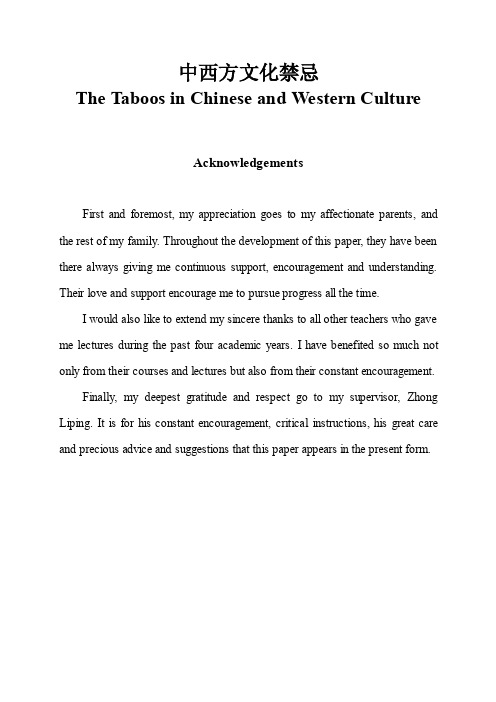
中西方文化禁忌The Taboos in Chinese and Western CultureAcknowledgementsFirst and foremost, my appreciation goes to my affectionate parents, and the rest of my family. Throughout the development of this paper, they have been there always giving me continuous support, encouragement and understanding. Their love and support encourage me to pursue progress all the time.I would also like to extend my sincere thanks to all other teachers who gave me lectures during the past four academic years. I have benefited so much not only from their courses and lectures but also from their constant encouragement.Finally, my deepest gratitude and respect go to my supervisor, Zhong Liping. It is for his constant encouragement, critical instructions, his great care and precious advice and suggestions that this paper appears in the present form.AbstractWith the development of economic globalization and China's Reform and Opening up, the connection between China and western countries are Increasingly close. And the communication and collisions between the Chinese and western culture also appear in each person's life. This thesis mainly introduced the Chinese and western cultural taboo from the definition of taboo to origin, then to the differences between Chinese and western cultural taboos, and finally research how to avoid touching these taboo in daily communication. This thesis involves these taboos of name, address, gender, race, religion, superstition and other espects relate to our life.And through these research readers will not touched others‘ taboo and even influence people‘s relationship in communication.Key words:Chinese and western; taboo; definition; origin of taboo; species of taboo; details of taboo; how to avoid touching taboo随着经济全球化的发展和中国对外开放程度的加深,中国和西方国家的联系也日益密切起来,中西方文化之间的交流和碰撞也出现在了每个人的生活中。
说英语国家禁忌
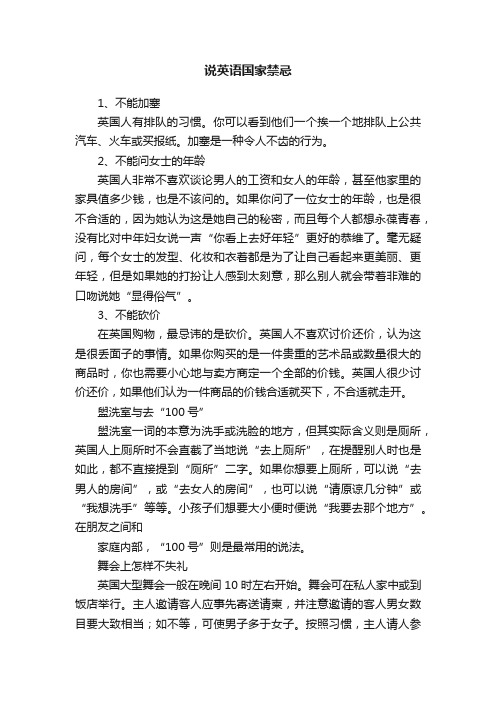
说英语国家禁忌1、不能加塞英国人有排队的习惯。
你可以看到他们一个挨一个地排队上公共汽车、火车或买报纸。
加塞是一种令人不齿的行为。
2、不能问女士的年龄英国人非常不喜欢谈论男人的工资和女人的年龄,甚至他家里的家具值多少钱,也是不该问的。
如果你问了一位女士的年龄,也是很不合适的,因为她认为这是她自己的秘密,而且每个人都想永葆青春,没有比对中年妇女说一声“你看上去好年轻”更好的恭维了。
毫无疑问,每个女士的发型、化妆和衣着都是为了让自己看起来更美丽、更年轻,但是如果她的打扮让人感到太刻意,那么别人就会带着非难的口吻说她“显得俗气”。
3、不能砍价在英国购物,最忌讳的是砍价。
英国人不喜欢讨价还价,认为这是很丢面子的事情。
如果你购买的是一件贵重的艺术品或数量很大的商品时,你也需要小心地与卖方商定一个全部的价钱。
英国人很少讨价还价,如果他们认为一件商品的价钱合适就买下,不合适就走开。
盥洗室与去“100号”盥洗室一词的本意为洗手或洗脸的地方,但其实际含义则是厕所,英国人上厕所时不会直截了当地说“去上厕所”,在提醒别人时也是如此,都不直接提到“厕所”二字。
如果你想要上厕所,可以说“去男人的房间”,或“去女人的房间”,也可以说“请原谅几分钟”或“我想洗手”等等。
小孩子们想要大小便时便说“我要去那个地方”。
在朋友之间和家庭内部,“100号”则是最常用的说法。
舞会上怎样不失礼英国大型舞会一般在晚间10时左右开始。
舞会可在私人家中或到饭店举行。
主人邀请客人应事先寄送请柬,并注意邀请的客人男女数目要大致相当;如不等,可使男子多于女子。
按照习惯,主人请人参加舞会,有时也设晚宴;有时光请跳舞而不设晚宴;而有的则请参加舞会的客人中少数人吃晚饭,饭后跳舞;其他人只能参加舞会而不能吃饭。
所以,被邀请的人一定要看清请柬上的字样,以免使主人难堪。
舞会上,主人备有夜宵,也可能只备些茶、咖啡和三明治等。
参加舞会的客人服装要整齐,跳舞时男宾要轮流请女宾,其中有一次必须与女主人跳舞。
